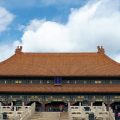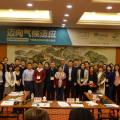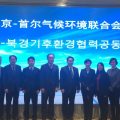International conferences on climate change and inclusive growth hosted in Seoul
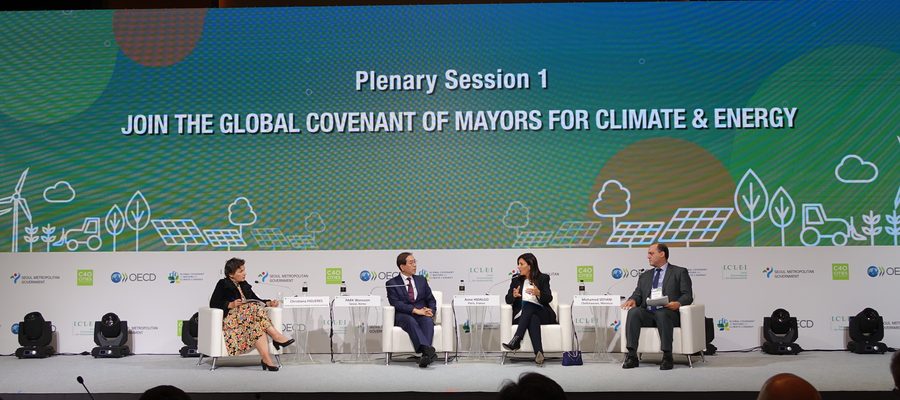
As the OECD Champion Mayor and ICLEI President City, the Seoul Metropolitan Government hosted “The 3rd Meeting of OECD Champion Mayors for Inclusive Growth” and the “Seoul Mayors Forum on Climate Change 2017” from October 19 to 20, gathering around 300 participants of representatives from cities such as Paris, New York, Tokyo, Tehran and Saint Petersburg, and international organization like UNISDR, GCF and CCAC.
Under the theme “Toward more inclusive, sustainable cities,” the two conferences provided an opportunity for cities and local governments to combine efforts in promoting inclusive growth and addressing climate change, and eventually enhance the coalition among cities to accelerate climate actions in close partnership with city residents.
In particular, the Seoul Mayors Forum on Climate Change 2017, co-hosted by the Seoul Metropolitan Government and ICLEI on October 20, served as a platform to showcase and encourage local governments to participate in the Global Covenant of Mayors for Climate & Energy (GCoM), an international initiative of local governments around the world with a shared long-term vision to accelerate voluntary climate actions.
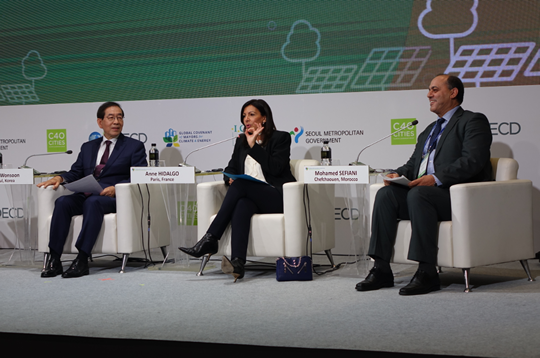
Seoul Mayor Park Won Soon, Paris Mayor Anne Hidalgo, and Chefchaouen Mayor Mohamed Sefiani invited
cities and local governments to join the Global Covenant of Mayors for Climate and Energy.
As mayor of the host city, Mayor Park of Seoul announced the Seoul Statement, encouraging national governments for responsible implementation of the Paris Agreement through various actions, with cities and local governments committed to playing an active role in the process. The Statement is aim for further discussion at the Climate Summit of Local and Regional Leaders to be held in Bonn in November 2017, and consequently delivered as a message from cities and local governments at the COP23.
“Cities are home to over 70% of the world’s population, and decisions made by mayors have become more important than ever before” said Christiana Figueres, Vice Chair of the Global Covenant of Mayors, “international cities cooperation platform will be decisive to the success of climate action.”
“Together, we are stronger.” Anne Hidalgo, Mayor of Paris
“Cities can enlarge their influences on climate change through city networks. ” Park Won Soon, Mayor of Seoul
“The Covenant can be an important tool because it raises our voice.” Mohamed Sefiani, Mayor of Chefchaouen
In the face of climate change — a mutual issue that cities need to work together fight against — Paris Mayor Anne Hidalgo, Seoul Mayor Park Won Soon, Chefchaouen Mayor Mohamed Sefiani highly appreciated City Networks that allow mayors from all over the world to come together, to share experiences and vision, and to get inspiration from activities done by others.
Active Citizens Engagement in Climate Actions
The Forum also marked the official launch of the Ambitious City Promises, a project funded by the International Climate Initiative (IKI) of the German Federal Ministry for the Environment, Nature Conservation, Building and Nuclear Safety (BMUB), and implemented by ICLEI. In scaling up the Promise of Seoul, an action plan that addresses climate change and socio-economic issues launched at ICLEI World Congress 2015, the ACP project is designed to support 9 Southeast Asian cities in establishing and implementing ambitious greenhouse gas reduction commitments and local climate actions together with citizens.
Assistant Mayor of Seoul Boyoun Hwang shared Seoul’s vision of low carbon initiative through citizen participation, and noted the value of citizen engagement in their communities acknowledging that small acts can lead to huge impacts. More importantly, when citizens voice their concerns, companies will also realize what should be prioritized over profit.
Seoul is ready to share its experiences and provide support to ensure the successful implementation of the Ambitious City Promises; participating Southeast Asian cities also expressed excitement to learn with Seoul and determine how to adapt the Promise of Seoul in their local context.
Co-benefits of Climate Action
In the afternoon, a session on co-benefits of climate action was chaired by Shu Zhu, Regional Director of ICLEI East Asia, inviting experts and city representatives from the Climate and Clean Air Coalition (CCAC), Tangerang (Indonesia), Changchun (China) and Tokyo (Japan) to share their local experiences and practices in addressing air pollution and climate change.
Helena Molin Valdés, head of the Climate and Clean Air Coalition Secretariat, underlines the fact that air pollution is not only harmful to human health and agriculture, but it also influences the climate. While carbon dioxide is no doubt the most significant greenhouse gas and a power shift away from the fossil fuel is urgently needed, Valdés reminded that the emission of short-term air pollutants should not be overlooked, as solely working on reducing carbon dioxide is simply insufficient for reaching the reduction target by 2050.
Wencai Xu, Member of the Standing Committee of the 13th Changchun Municipal Committee, presented the city’s 2017 Air Pollution Control Action Plan. With strong political leadership support, the city is currently focusing on air pollution control, and will also start looking at the reduction of CO2 emission.
Akiko Matsumoto, Senior Director for Policy Coordination of Tokyo shared the assessment program for freight companies launched by the city back in 2012. Through measuring and disclosing freight companies’ CO2 emissions from vehicles, the program turned out an incentive for companies to showcase their efforts and action results in improving the environment.
While sharing the actions taken by Tangergang, Mayor Arif Rachadiono Wismansyah of the city highlighted the importance of local governments having well-developed action plans and having citizens engaged. He explained, “instead of only being aware of air pollution and climate change, people need to know what they can do, and how they can do.”
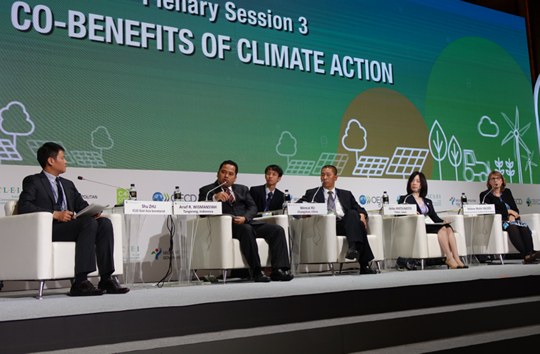
ICLEI East Asia Director Shu Zhu, Tangergang Mayor Arif Rachadiono Wismansyah, Member of the Standing Committee of the 13th Changchun Municipal Committee Wencai Xu, Senior Director for Policy Coordination of Tokyo Akiko Matsumoto, and Head of the Climate and Clean Air Coalition Secretariat Helena Molin Valdés shared their expertise in the co-benefits of climate actions.
Adapting to the Changing Climate
Topics of climate adaptation, sustainable procurement and energy transition were also further explored during parallel sessions.
Besides presentations made by UNISDR and ICLEI East Asia, city representatives from Tehran (Iran), New York (US), and Saint Petersburg (Russia) also shared their experiences in enhancing urban resilience in their local context.
Daniel A. Zarrilli, senior director at the Climate Policy and Programs, New York City Office of the Mayor, said, major natural disasters, such as Hurricane Sandy in 2012 which caused 90 billion dollars damage and a great number of life loss, made New York rethink about its resilience strategy.
In preparing for the future and ensuring that such damages would not re-occur, the city’s multi-layer resilience strategy has led to active mitigation actions. New York is now upgrading the coastal defences and investing new infrastructures. New building codes which incorporate update parameters from climate projections are implemented. At the same time, higher threshold of fossil fuel use reduction has been set to the building sector, which is known to be responsible for ⅔ of GHG emissions in the city.
“We are not doing resilience project. Instead, we do projects in a more resilient way” Zarrilli summarized what is happening in New York, and added, “a key learning is that we cannot simply pick up some solutions from other cities and put them in New York.” Rather, it is important that cities go through the context and understand the risks they are facing.
Sustainable Procurement
Public procurement accounts for 15-20% of global GDP, yet the power of sustainable procurement to harness sustainable development challenges has been underappreciated. As giant consumers, public agencies have enormous leverage power to stimulate the market transforming towards green growth.
Korean city Suwon shared its achievement to double the percentage of green public procurement in 2017 through multiple strategic plans, which includes its active participation in the 10YFP on SPP project co-led by ICLEI and KEITI (Korea Environmental Industry and Technology Institute).
Minuk Choi, Officer of the Environment Department of Suwon City, said that while the national green public procurement monitoring system allows procurers to easily access green products, smaller amount purchases have been left out from the monitoring system. Moreover, as green public procurement in Korea is limited to products at the moment, further work to include contracting services in green public procurement is needed.
Experts and city representatives at the panel all agreed that green products could be relatively more expensive; nevertheless, life cycle costing (LCC) and sustainability should always be taken into consideration, instead of doing simple economic comparison. In persuading political leaders and local authorities to prioritize green procurement, Hyunju Lee, Associate Researcher of Sustainable Lifestyle Office of KEITI, suggested concrete numbers and data collected through monitoring and measurement to be powerful tools.
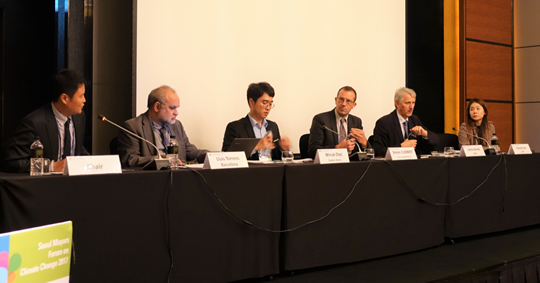
Experts and city representatives shared their experiences and opinions on promoting green public procurement at the local level.
Energy Transition in Korea
The Ministry of Trade, Industry and Energy of Korea (MOTIE) has announced Renewable Energy 3020 Plan and has shown intention to work closely with local governments. At the same time, numerous leading cities and local governments have already initiated their own plans and efforts on energy transition through the expansion of renewable energy at the local level.
Facilitated by Yeonhee Park, Director of the ICLEI Korea Office, a special session was hosted aiming to explore ways of effective cooperation strategies among Korean national and local governments based on stakeholder engagement towards achieving the country’s 3020 Renewable Energy Plan.
Experts and local government representatives at the panel agreed that local and regional governments are at the forefront of engaging citizens. In better promoting energy transition, more communications should be done. These include training, public relations, and raising public awareness targeted at the goals we aim to achieve.


